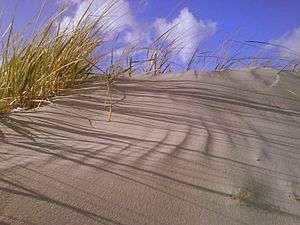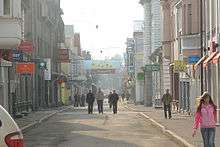Pärnu
Pärnu is a resort seaside city (and Estonia's summer capital) with a small harbour in south-western Estonia.
Understand

The city is known for its spas, shallow white sandy beach and beautiful parks. It is also a popular place for conferences, theatre performances and concerts. In 1838 the first spa was opened and nowadays Pärnu is a health resort of international stature.
During the Great Northern War, the University of Tartu was relocated to Pärnu from 1699-1710. Tartu University still has a branch campus there today.
Since 1996 Pärnu has been known as Estonia's Summer Capital. Beach life, dozens of festivals, night clubs, big party crowds, concerts and funfairs - Pärnu has it all.
Pärnu is an ancient Hanseatic town where a medieval festival and an arts and crafts fair are held every summer.
- Tourist Information Centre, Uus 4, ☎ +372 447 3000, e-mail: parnu@visitestonia.com.
Get in
See Estonia#Get around for bus and train schedules.
By bus
Buses arrive at the small bus station (bussijaam) on the border of the old town. This bus station feels like a big bus stop because the terminal building is somewhat hidden on the opposite side of the street. Note a fast-food kiosk nearby. It opens early in the morning and caters to morning travellers while the whole city is still sleeping.
Buses from Tallinn depart every hour and reach Pärnu in about two hours. You can also travel from Viljandi (1 h) and Tartu (2.5-3 h), Kuressaare (3 h), and Valga (2.5 h). There is one daily bus from Saint Petersburg in Russia with a stop in Narva (5 h). Check the schedules at here.
Pärnu is a major stop in the middle of the Tallinn–Riga route. Buses run every 1-2 hours and connect you to the Latvian capital in 2.5 h. Pärnu can be an excellent stopover on your away between the Baltic capitals.
By train
Pärnu has a train connection to Tallinn. Trains depart from Tallinn and from Pärnu twice a day. The journey takes about 3 hours, check the Edelaraudtee website for the current schedule. The station building has been razed down recently, so the train drops you at some strange place 3 km south of the city center (reachable by city bus, though). In contrast to Tartu, train connections to Pärnu are underdeveloped and remain inferior to the abundant bus options.
By car
Pärnu has road connections to Tallinn (128 km), Haapsalu (108 km), Tartu (174 km), as well as to Riga in Latvia (184 km). The major artery of the Baltic states, Via Baltica, passes near Pärnu.
By plane
- Pärnu airport (EPU IATA) (is 4 km north-west of the city). It has some regular flights, but you are more likely to use this airport for continuing your journey from Pärnu rather than for traveling to the city. Luftverkehr Friesland-Harle operates flights to the islands of Ruhnu (regular) and Kihnu (on request only). The Ruhnu flight continues to Kuressaare and costs about €25 for each flight segment.
Expect absolutely no service at the airport. You will have to call taxi or arrange some other private transportation to the city. City bus #23 runs to the airport twice a day, but its schedule is adjusted to the airport staff, not to sporadic travelers.
By boat
Pärnu has a large port, which is mostly used for cargo traffic. Ferries to the island of Kihnu depart from the Munalaid dock located 35 km west of Pärnu. However, a small passenger harbor exists at Kalda 2(right at the city center) and may serve occasional weekend ferries to Kihnu and Ruhnu.
If you are arriving by sail boat (keelyacht), you can dock at the Pärnu Yacht Club. To stay with motorboat you can use Talvesadam on Pärnu moat (Pärnu vallikraav). Pärnu moat on Google map.
Get around

By bus
The bus network covers the whole city, including the suburbs. There are 26 routes and their schedules can be found at Pärnu ATP-s website.
By foot
Pärnu's old town is pretty small and navigable by foot and it's full of small boutiques. Lots of them are on Rüütli street.
See
- The old town with buildings even from Medieval times.
- Beautiful wooden villas.
- The beach park and promenade.
- Art galleries. Lydia Koidula and Modern Art Museum and City gallery
- Pärnu Town Hall, Nikolai tn 3. The Town Hall is located in a house built in 1797 by the merchant P.R. Harder. In 1804, the Russian czar Alexander I stayed in this house during his visit to Pärnu. A new art nouveau building with neo-baroque details was completed in 1911 to the north side of the town hall.
- Church of Jekaterina, Vee tn 8. Completed in 1768, the Church of Jekaterina is the most style pure and ample baroque church in Estonia. The church has influenced the development of orthodox church architecture in whole Balticum. To this day Pärnu Russian congregation operates in the church.
- Seegi Maja (the Almshouse), Hospidali tn 1. Seegi Maja (the Almshouse) is known to be the oldest building in Pärnu. It was built in 1658 on the remains of the old almshouse of the Holy Spirit's Church as a shelter to the sick and the cripples.Based on research on the wooden raft under the basement of the building, the old almshouse dates back to 1250-1350. The building was restored to look the way it did in the 17th century. It houses the St. Peterburg Hotel and the restaurant Seegi Maja.
- Statue of Raimond Valgre, Mere puiestee 22. The musician Raimond Valgre who played in Pärnu in 1930s and brought the town a lot of fame, can today be found sitting in the park near Kuursaal, as a bronze statue. You too can sit down next to the beloved Estonian composer and enjoy his beautiful compositions.
- Eliisabet's Church, Nikolai tn 22. Eliisabet's Church, inaugurated in 1750, is the most outstanding sacral building of the Baroque period in Estonia. One of the best organs in Estonia is in Eliisabet's Church and the place is popular as a concert hall among music lovers.
Do
- The Pärnu Jetty, Seedri tn 6, Pärnu. The jetty has gained a romantic aura as a place for lovers to take walks on; however, before taking a walk there, be sure to check the water level! The length of both jetties is a bit over two kilometres.
Outdoor activities
- The beach promenade. Pärnu has a long beach that opens to the south and has lovely, almost white sand. It is a major Baltic seaside resort. Completed in 2006, the attractive Beach Promenade has the feeling of a real resort and makes the Summer Capital's beaches inviting even in bad weather! Well thought-out lighting keeps the beach active even when the sun goes down, and the playing colours of the fountains are a sight in themselves in the dark of night.
- Sassi Talu, Kabriste küla, Audru vald (18 km west of Pärnu), ☎ +372 56 467 301, e-mail: Riding@sassitalu.com. Horseback riding. European-standards excellent service and reception; good both for novice and for experienced riders.
Spa and baths
- Vee Park. It may rain in summer, and when it does many Estonian holiday makers go indoors to the Vee Park, which is an indoor water park at the largest beachside hotel. As water parks go, this one is fantastic, and insures that your few days at the beach won't be wasted because of inclement weather.
In winter time, consider one of the many spa hotels:
- Spa Estonia. Modern and moderate-priced; great variety of medical treatment and procedures.
Festivals
- The Pärnu International Documentary and Anthropology Film Festival.
- David Oistrahh festival.
- Organ festival.
- Bacardi Feeling Beach festival.
- Hanseatic and Handicraft days.
Art
Just south of downtown is a modern art museum and art school. Exhibits change frequently, and are often edgy and provocative.
Buy
Eat
Budget
- Peetri Pizza, Kuninga 34, ☎ +372 4439333. M–Su 10–22:00. pizzeria
- McDonald's, Tallinna mnt 74, ☎ +372 5226113. M–Su 10–22:00, McDrive 24h. fast food
- Pappa Pizza, Papiniidu 42, ☎ +372 4461889. M–Sa 08–20:00, Su 08–19:00. pizzeria
Mid-range
- 🌍 Kolhehti, Kuninga 36, ☎ +372 56 296 555. Tu-Th 12-21:00, F-Sa 12-22:00, Su 12-21:00. Small and cozy restaurant serving all sorts of Georgian dishes. If you are at least two persons, want to taste most of what is on the menu and are really hungry, try the "Georgian celebration plate for two"; it also includes a jar of the famous - albeit salty - Georgian mineral water Borjomi. Mains €10-12.
Drink
Pärnu has several clubs and lounges, most of them located in the center near Rüütli street. There are also many cozy terraces and pubs around the numerous parks in the summer time.
Sleep
On Sauga river you can stay on a boat at the Sauga Sadam fishing village.
Budget
- 🌍 Hostel South Pärnu (Hostel Lõuna), Lõuna 2, ☎ +372 4430943, e-mail: hostel@eliisabet.ee. Inexpensive and recommended. Dorm from €9.50.
- Residence Konse, 44a Suur Joe.
- EstRent Cottages. Holiday Cottages and Apartments in Pärnu
Mid-range
- Victoria Hotel. Small historical hotel in the city centre.
- Villa Andropoff, Valgeranna küla, Audru vald 88326 (9 km from Pärnu), ☎ +372 4443 453, fax: +372 4442 004, e-mail: info@andropoff.ee. Check-in: 14:00, check-out: 12:00. Twin room €50.
- 🌍 Hotel Pärnu (Hotell Pärnu), Ruutli 44, ☎ +372 447 8911, fax: +372 447 8905, e-mail: info@hotelparnu.com. Check-out: 12:00. Centrally located — most things worth seeing can be reached within ten minutes by foot. The outside doesn't look very appealing but the rooms are clean and modern, with well working Wi-Fi, balcony and air conditioner. Their Restaurant Embecke is on the ground floor. The room price includes a generous breakfast buffet and the use of the hotel's sauna. Standard twin room €62.
Go next
If you dare leave urban pleasures behind, there is great countryside to explore. Many cultural and sports events offer entertainment all year round. The enthralling nature of Pärnu County, which offering ample, quality opportunities for active holidays, supplements the greenery of city parks and boulevards. Walks in the forest, kayak trips on rivers and the sea, riding, fishing, hunting trips, adventurous bog or canoe trips to Soomaa National Park and elsewhere in the county offer great escapes. In winter, you can partake in skiing, snowshoe and kick sledge trips, or a sledge safari and enjoy a sauna steam.
- Lottemaa
- Valgeranna – Village with large beaches and an amusement park.
- Kihnu – The southernmost group of islands, Khinu, is on the UNESCO World Heritage List. Cosy and warm yet exotic – folk costumes are worn here every day and the handicraft of older generations remains highly valued.
- Ruhnu – The communal territory corresponds to that of the homonymous island, formerly known as Runö.
- Kabli – A quiet seaside village on the Gulf of Riga with bird-ringing centre and rural beaches.
- Latvia – The border is about 60 km south of Pärnu. Even more sand beaches, interesting castles in the cities of Cēsis and Sigulda, plus of course the Latvian capital Riga with things to see and do for several days.